
French Canadians, or Franco-Canadians, are an ethnic group who trace their ancestry to French colonists who settled in France's colony of Canada beginning in the 17th century.
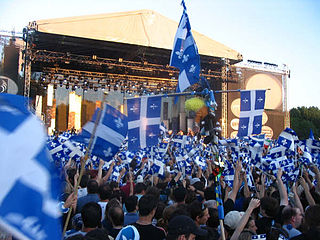
Quebec nationalism or Québécois nationalism is a feeling and a political doctrine that prioritizes cultural belonging to, the defence of the interests of, and the recognition of the political legitimacy of the Québécois nation. It has been a movement and a central issue in Quebec politics since the beginning of the 19th century. Québécois nationalism has seen several political, ideological and partisan variations and incarnations over the years.
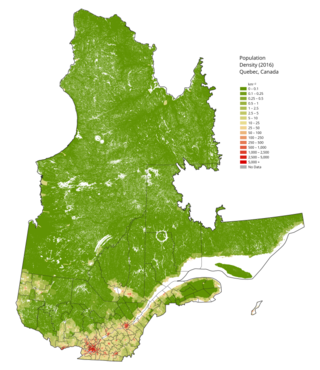
The demographics of Quebec constitutes a complex and sensitive issue, especially as it relates to the National question. Quebec is the only one of Canada's provinces to feature a francophone (French-speaking) majority, and where anglophones (English-speakers) constitute an officially recognized minority group. According to the 2011 census, French is spoken by more than 85.5% of the population while this number rises to 88% for children under 15 years old. According to the 2011 census, 95% of Quebec are able to conduct a conversation in French, with less than 5% of the population not able to speak French.

Franco-Manitobans are French Canadians or Canadian francophones living in the province of Manitoba. According to the 2016 Canadian Census, 40,975 residents of the province stated that French was their mother tongue. In the same census, 148,810 Manitobans claimed to have either full or partial French ancestry. There are several Franco-Manitoban communities throughout Manitoba, although the majority are based in either the Winnipeg Capital Region or the Eastman Region.
This article presents the current language demographics of the Canadian province of Quebec.
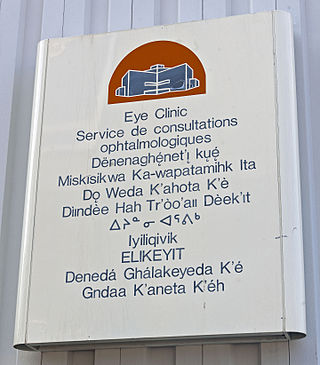
A multitude of languages have always been spoken in Canada. Prior to Confederation, the territories that would become Canada were home to over 70 distinct languages across 12 or so language families. Today, a majority of those indigenous languages are still spoken; however, most are endangered and only about 0.6% of the Canadian population report an Indigenous language as their mother tongue. Since the establishment of the Canadian state, English and French have been the co-official languages and are, by far, the most-spoken languages in the country.
Francization or Francisation, also known as Frenchification, is the expansion of French language use—either through willful adoption or coercion—by more and more social groups who had not before used the language as a common means of expression in daily life. As a linguistic concept, known usually as gallicization, it is the practice of modifying foreign words, names, and phrases to make them easier to spell, pronounce, or understand in French.
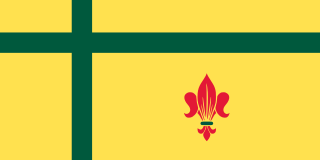
Fransaskois, , Franco-Saskatchewanais or Franco-Saskatchewanians are French Canadians or Canadian francophones living in the province of Saskatchewan. According to the 2016 Canadian Census, approximately 17,735 residents of the province stated that French was their mother tongue. In the same census, 125,810 Saskatchewanians claimed full or partial French ancestry. There are several Fransaskois communities in Saskatchewan, although the majority of francophones in Saskatchewan reside in the province's three largest cities, Saskatoon, Regina, and Prince Albert.
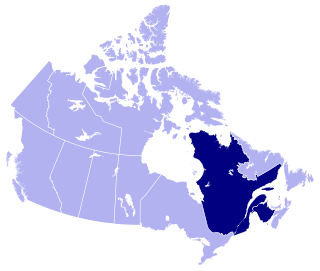
French is the mother tongue of approximately 7.2 million Canadians according to the 2016 Canadian Census. Most Canadian native speakers of French live in Quebec, the only province where French is the majority and the sole official language. Of Quebec's people, 71.2 percent are native francophones and 95 percent speak French as their first or second language.

The official languages of Canada are English and French, which "have equality of status and equal rights and privileges as to their use in all institutions of the Parliament and Government of Canada," according to Canada's constitution. "Official bilingualism" is the term used in Canada to collectively describe the policies, constitutional provisions, and laws that ensure legal equality of English and French in the Parliament and courts of Canada, protect the linguistic rights of English- and French-speaking minorities in different provinces, and ensure a level of government services in both languages across Canada.
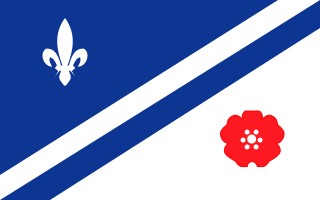
Franco-Albertans are francophone residents of the Canadian province of Alberta. Franco-Albertans may also refer to residents of Alberta with French Canadian ancestry, although publications from the government of Alberta use the term Franco-Albertan to refer to its francophone residents. In the 2016 Canadian Census, there were 86,705 Albertans that stated their mother tongue was French. In the same census, there were 411,315 Albertans that claim partial or full French ancestry.

New Brunswick is one of Canada's three Maritime provinces and the only officially bilingual province in the country. The provincial Department of Finance estimates that the province's population in 2006 was 729,997 of which the majority is English-speaking but with a substantial French-speaking minority of mostly Acadian origin.
Yukon is the westernmost of Canada's three northern territories. Its capital is Whitehorse. People from Yukon are known as Yukoners. Unlike in other Canadian provinces and territories, Statistics Canada uses the entire territory as a single at-large census division.
Canadian French is the French language as it is spoken in Canada. It includes multiple varieties, the most prominent of which is Québécois. Formerly Canadian French referred solely to Quebec French and the closely related varieties of Ontario (Franco-Ontarian) and Western Canada—in contrast with Acadian French, which is spoken by Acadians in New Brunswick and some areas of Nova Scotia, Prince Edward Island and Newfoundland & Labrador.

Franco-Yukonnais are French Canadian or French-speaking residents of Yukon, a territory of Canada. French has full official language status in the Yukon.
The language policies of Canada's province and territories vary between the provinces and territories of Canada. Although the federal government operates as an officially bilingual institution, providing services in English and French, several provincial governments have also instituted or legislated their own language policies.
Quebecers or Quebeckers are people associated with Quebec. The term is most often used in reference to either descendants of the French settlers in Quebec or people of any ethnicity who live and trace their origins in the province of Quebec.

The history of Professional wrestling in Canada dates back to the founding of Maple Leaf Wrestling, which opened in 1930 and was the first known professional wrestling company in the country. Many Canadian wrestlers including Bret Hart, Roddy Piper, Edge, Chris Jericho, and Kenny Omega have gone on to achieve worldwide success.
English-speaking Quebecers, also known as Anglo-Quebecers, English Quebecers, or Anglophone Quebecers or simply Anglos in a Quebec context, are a linguistic minority in the francophone province of Quebec. According to the 2011 Canadian census, 599,225 people in Quebec declare English as a mother tongue. When asked, 834,950 people reported using English the most at home.
The Summit on the Rapprochement of Canadian Francophonies was a summit between the different francophone communities in Canada in June 2021.
This article has been partially or totally translated from the French-language article Canadiens francophones.























